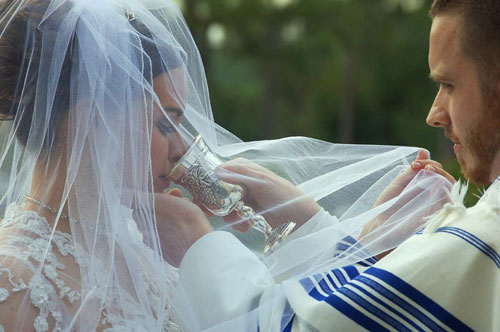

For Jewish culture, marriage is considered extremely important because a man without a wife or a woman without a husband is considered an incomplete being. Starting from the betrothal, the meaningfulness of the wedding traditions imply the ideas of returning man and woman to the state of being one soul (something God interrupted when He created Eve from a rib from Adam) and the idea that this union has to be blessed by God.
Before the wedding, a contract called ketubah is read before the groom. He accepts it and then witnesses sign the contract. Later, the bride is veiled and taken to the chuppah (where the ceremony takes place, the chuppah is a representation of a house) and there the groom verifies that the bride is his future wife (as Jacob got married to Leah instead of Rachel in the Old Testament).
In the next part of the Jewish wedding, the bride circles the groom a few times (depending on the tradition she has chosen to follow) and, after this, both groom and bride drink from a cup of wine, which is the beginning of the ceremony. The exchange of rings, the reading of the contract, the pronouncement of the seven benedictions and the couple's second drinking of a cup of wine are the next steps. After that, the groom steps on the cup of wine and breaks it as a reminder of Jews' sadness for the destruction of the temple of Jerusalem.
After the ceremony ends, groom and bride retire to a private room. Traditionally, it was to consummate the marriage, nowadays, it is to be some time on their own before greeting the guests.
What follows? The party, of course; and after some dance, a festive meal, which is the beginning of groom and bride's life together. As they fasted the whole day, you bet this meal will be eaten with joy!
Not very likely, a Jewish woman is absolutely forbidden to marry a non-Jewish man.